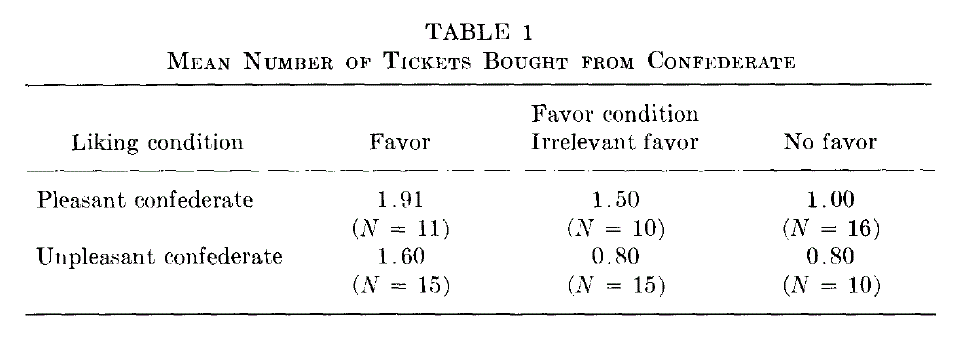Anyone who’s been to societies’ fairs at university can
attest to the fact that a lot of the different societies attempt to lure new
members in by offering them chocolates, biscuits or even free mugs. In fact
this is making the use of the rule of reciprocation – people generally feel
obligated to repay a favour, invitation or a gift. In this case students
receive the “gift” of a free chocolate and then feel that they have to give
something in return, ranging from just listening to a member of the exec talk
about how amazing the socials at the board game society are, to actually paying
the fee to join a particular society.
Research by Dennis Regan (1971) shows that people are more
likely to comply with a request from someone, if they had been provided with a
favour by that person beforehand. The experiment involved 81 freshmen (all men)
at Stanford University and also looked at whether liking a person affected the subjects’
compliance, however we will not focus on that here. The subject would be asked
to have a seat by the secretary and wait for the experiment to begin. Then the
secretary would leave and another person would enter, who the subject would
think is just someone else taking part in the experiment, but is in actual fact
a confederate. After liking manipulation took place (the subject would either
see the confederate behave in a polite and pleasant manner, or in a rude way), the
two people were seated at desks in adjoining rooms and told that they were
taking part in an experiment about appreciation of art. During a short break,
the confederate would leave the room and favour manipulation would take place.
Favour Condition: the confederate returns with two Cokes and
offer one to the subject.
No Favour Condition: the confederate returns empty-handed.
Irrelevant Favour Condition: introduced to account for the
possibility of later compliance being related to a general effect of the favour
such as improved mood. In this condition the confederate returns empty-handed,
but the experimenter gives both the subject and the confederate a Coke.
In the next break, during which the experimenter would tell
the two to not talk at all, the confederate would write a note to the subject
asking them to buy some raffle tickets.
The table below shows the results in term of the mean number
of raffle tickets bought by the subjects. About twice as many were bought if
the confederate bought the subject a Coke (Favour Condition) in comparison to
the no favour condition, regardless of the liking condition (pleasant or
unpleasant). However, in the condition where the confederate behaved in a pleasant
manner, the subjects also appeared to buy more raffle tickets in the Irrelevant
Favour Condition perhaps partly due to the general positive atmosphere.
Overall, we can see that people are more likely to comply
with a request from a person who has provided them with a favour, even if they
don’t particularly like that person. Therefore free chocolates ought to result
in an increased number of society members, which is why societies use them,
essentially as bait.


No comments:
Post a Comment
Note: Only a member of this blog may post a comment.